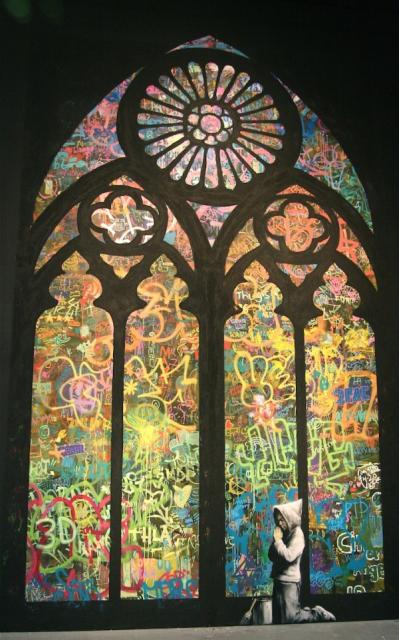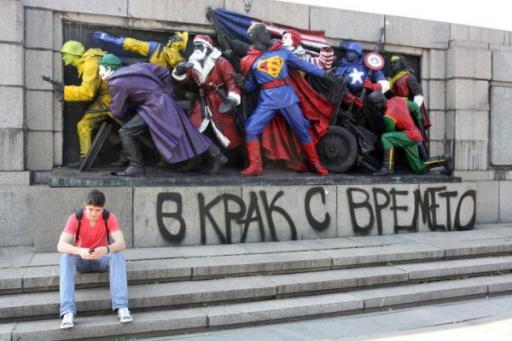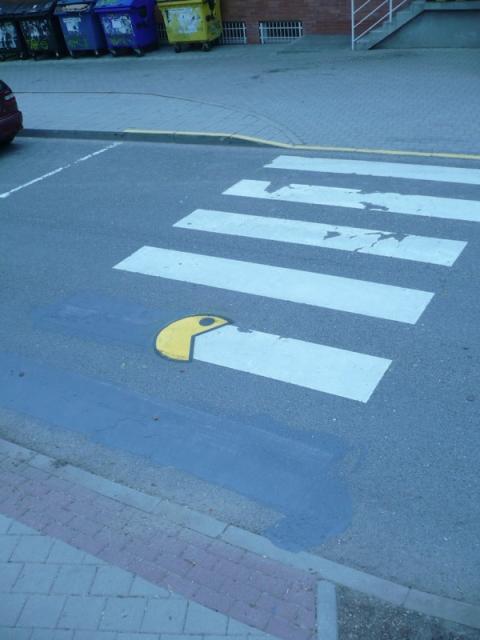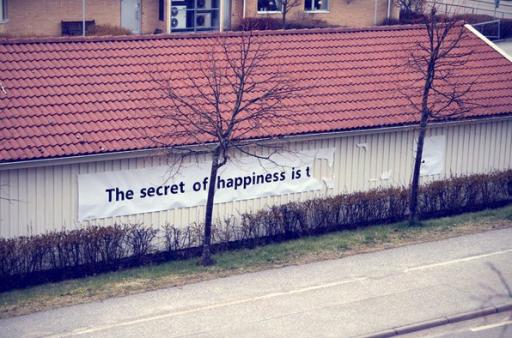The Null Device
Posts matching tags '2011'
2012/2/4
A French blog named Tout Bon has a gallery of the most interesting street art of 2011 (for varying definitions of "street art"):





And plenty more...
2011/12/31
And now, here is my list of notable records of 2011:
- Architecture In Helsinki Moment Bends
With their previous album, released way back in 2007, AIH shook off the "twee" label and let rip with some nitro-charged machismo; now, four years later, they turn to the daggy side of the force. Moment Bends celebrates all the elements of mainstream pop that filled the airwaves in the 1980s by building them into a neon edifice to vintage electro-pop kitsch. It's all here: synth licks you swear you've heard before in a mid-80s movie soundtrack or album (is that Glenn Frey? And over there, you can just about hear Control-era Janet Jackson), shimmering arpeggios, a plastic reggae riddim here (in the opening cut Desert Island), some synth brass there, even the odd gear change and Clearmountain break for the sake of completeness. The word "chillwave" may come to mind, though AIH differ from the chillwave aesthetic in their eschewal of the gauzy haze afforded by shoegaze-style reverb and delay; everything here is clear and upfront, with the possible exception of the lyrics, which, in AIH fashion, would be a little too oblique for the 1980s-vintage Top 40. File alongside the new M83 double album.
- Constant Light, Mag - Amplitude
Released as a download on Constant Light's Bandcamp page, the Melbourne duo's debut, Mag - Amplitude consists of a mere six tracks, varying in length between 2 and 10 minutes, and falls somewhere in the post-rock/instrumental spectrum, driven by bass guitars, synthesiser patterns, processed guitar and layered textures. The influences range from the kosmische musik of 1970s West Germany to the monochromatic drone of 1980s New Wave (Factory Floor captures the mood of a certain Manchester label and takes it for a ride down the Autobahn). Half of the album is taken up with a three-piece composition,
Dreams of Dreams Denied, which opens with languid acoustic guitar and harmonica figures, like Morricone meeting Mogwai, drifts through layers of shifting texture, motors on into a driving rhythm propelled by guitars and drums, before coming to rest in a glorious finale of coruscating synths. - Geoffrey O'Connor, Vanity Is Forever
The capsule summary sounds almost like the punchline to a hipster joke: "Inner-Melbourne coolsie makes yacht rock album". On the surface, this is what Vanity Is Forever is: Geoffrey O'Connor, the fey, long-haired frontman of twee-pop combo Crayon Fields has come back with a radical image change. Gated drums, syrupy synth keyboards, and the kind of production that sounds like a million dollars in 1980s money; only the label (Guy Blackman's credible Melbourne indie Chapter Music) and year of release hint that this wasn't recorded in an bleedingly expensive studio in Aruba. As for Geoffrey, he has, well, "grown up" is perhaps not the right cliché, though as he himself puts it, embraced the artifice of it all; his previous sound of 1960s-vintage pastoral innocence, naïve almost to the point of childlikeness (itself arguably an artifice) has been buried beneath a sheen akin to Bryan Ferry in his imperial phase, with touches of Italianate chintz worthy of the San Remo Ballroom. Geoffrey's old façade of elfin faux-naïveté reappears in places (particularly in Like They Say It Does, where he pushes it almost to the point of self-mockery), though the album is in a much more adult mode, hinting copiously at the exhilarating heights of erotic passion with a new lover (voiced, in one song, by Melbourne's own Jessica Says), and mentioning offhandly that it's going on her indolent soon-to-be-ex-boyfriend's credit card. An intriguing change of direction, and a stylishly crafted album that picks its references well.
- Hong Kong In The 60s, My Fantoms
Their first full-length non-instrumental album (before they had an EP and an instrumental album), and it's as subtle as you'd expect, starting off with the dreamy Casiotone-driven ballad of When You Were Dreaming, and proceeding to the bossa-tinged, synth-accented You Can Take A Heart But You Can't Make It Beat, before foraying into a Les Petits Chasseurs Du Son, an instrumental interlude which sounds like Wendy Carlos scoring a Dario Argento film. The rest of the album is in a similar vein, mixing subtle pop with the odd cinematic pretension (such as Theme From King Of Chinatown), before drifting off with the ethereal Shadow Of The Bear.
- I Break Horses, Hearts, and Korallreven, An Album By Korallreven
Two albums, both from Sweden and exploring the spaces between electronica, shoegaze and what, for lack of a better word, may be termed "indie rock". Korallreven are the latest practitioners of the improbably-named Swedish Balearic Pop subgenre, and, for the most part, don't veer wildly from the footsteps of predecessors like Air France and Boat Club. (Swedish Balearic, for what it's worth, is somewhere between chillwave and the Café Del Mar chillout compilations that were big about a decade ago; think pulsing synthesizers punctuated with acoustic guitars, bongos and reverb-drenched vocal fragments; tropical-holiday-island imagery and a production sensibility informed by shoegaze.) Having said that, Korallreven (a duo, one of whom plays in Stockholm shoegaze-pop combo The Radio Dept.) are pros at it and do it well, doing for the subgenre what pop veterans Empire Of The Sun did for indie-dance in Australia. I Break Horses, meanwhile, started off as a duo and grew into a band; they're not part of the Balearic scene, though explore their own space a similar space; their album consists of layers of electronics, guitars and live drums, with songs evoking the likes of My Bloody Valentine, Suicide and New Order, as well as more recent bands like M83 and The Radio Dept.
- The Leaf Library, Different Activities, Similar Diversions
The long-awaited full-length début from the London motorik pop combo (available from their BandCamp page) alternates between driving rhythms backed with choppy guitars and washes of Casiotone keyboards and more languid moments of hushed vocals backed by layers of subtle instruments; equal parts Yo La Tengo and Stereolab with perhaps a hint of Aphex Twin in places. This album is understatedly lovely, and gets its beauty from artful arrangements of texture and repetition. It sits well alongside both Constant Light and Hong Kong In The 60s.
- My Sad Captains, Fight Less, Win More
Their début album made my list of 2009, and I've been eagerly awaiting their follow-up; I'm glad to say that it does indeed live up to my expectations. It doesn't depart far from their sound. Fight Less, Win More is an appropriate title; its laconic pop sound could scarcely be less combative, and its catchy melodies and literate lyrics are hard to resist. It stays mostly in an understated, vaguely pastoral indiepop vein, driven by clean guitars, drums, low-key vocals and the odd Mellotron, though toys with krautrock dynamics in places (the motorik crescendo of The Homefront Pt. II, and the rhythm that propels Heavy Lifting forward). Other highlights include the anthemic Little Joanne, the opening cut Orienteers, which evokes a number of pastoral pop groups from Melbourne, and Resolutions, which ends with fuzzy guitar.
- Still Corners, Creatures Of An Hour
One of the more intriguing bands to come out of London in recent years; Still Corners are equal parts Broadcast, early Paradise Motel and the Twin Peaks soundtrack; their debut album, released on Sub Pop, keeps true to the dreamlike quality of their 7"s and shows, with Tessa's lovely vocals floating spectrally over swirling organs, keening guitar feedback, clunking bass guitars and the odd drum machine. The whole album has a subtle, somewhat unreal quality; it doesn't sound like something belonging to any specific place or time. Highlights include the opening track Cuckoo, the previously released Endless Summer, with its Be My Baby-quoting opening, and the unseasonably summery The White Season.
- Veronica Falls, Veronica Falls
The latest in a decades-long game of transatlantic stylistic ping-pong: in 1980s Britain, the movement that became known as C86 reacted against expensive overproduction and/or the yuppie excesses of the Thatcher era by returning to the basics of guitar-and-drums pop music circa the 1960s updated for the post-punk era. (This was the 1980s, when synthesisers and studio effects cost real money.) A few decades later, hip bands from Brooklyn like The Vivian Girls and Crystal Stilts dusted off C86 and made it their own. Now, Veronica Falls (a band formed from veterans of several London and Glasgow bands) takes the New York sound and brings it back. The result is a slab of tight garage rock with choppy guitars, boy-girl harmonies and classic themes of love and death like something out of a pulp paperback from the 1950s. It doesn't break much new ground, but it does what it does well.
- various artists, The Endless House Project
Ostensibly a rerelease of the brief recorded works of an art collective, as short-lived as it was improbable, that flourished in a futuristic studio-discotheque behind the Iron Curtain in 1973, prefiguring kosmische krautrock and Detroit techno; in reality, almost certainly a more recent work of counterfactual history, presenting a fantasy view of a glamorous European avant-garde, with an almost Wes Andersonian unreality that could only be imagined from the splendid isolation of the English-speaking world. The Endless House Project works both as an exercise in hauntology (as long as one suspends one's disbelief about its geopolitical impossibility; which is where being British, and taking a vaguely orientalist view of the European continent as an exotic whole, might help) and as a collection of retrofuturistic analogue electronica. The opening track, Ostend (Invisible Cities) by one "Johannus Arpensium", starts with mighty, swelling synthesiser chords that soon break into driving, proto-Kraftwerkian arpeggios zooming down luminous highways with vocoded vocals. From there, we are led on a tour of retrofuturistic utopias and dystopias, expressed in analogue electronic music: ominous chords play over rhythm tracks of electronic clicks, as European-accented voices intone obliquely. Other tracks, meanwhile, (like Ernest Kantor's Jealousie (Escape To Outer Space) and Rasmus Folk's luxurious yet melancholic Coupe) are almost weightlessly breezy. the whole thing ends with the last work ostensibly played at the doomed Endless House, in which mastermind Jiri Kantor asks why it all happened so quickly and then leaves the stage, leaving the synthesisers to run by themselves and foreshadowing New Order's stage shows circa 1983. The album (sold only directly, in physical format, by an outfit named Dramatic Records) comes in an envelope with postcards giving capsule biographies of the ostensible composers of the pieces, a motley crew of European playboys and avant-gardists with names like Felix Uran, Klaus Pinter and Earnesto Rogers.
Were I to anoint one title as my record of the year, the accolade would probably go to My Sad Captains.